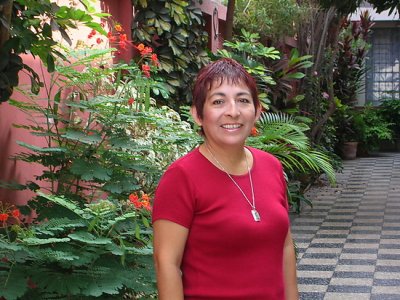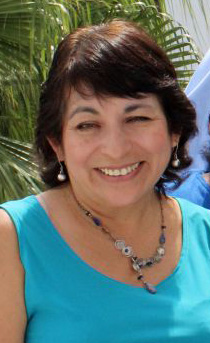Former Peru SST coordinator Celia Vasquez dies at 66


Celia Vasquez, who helped to establish Goshen College’s Study-Service Term (SST) program in Peru in 2005 and served for more than a decade as a country coordinator, accompanying hundreds of students on their intercultural journey, died on June 21. She was 66 years old.
Vasquez’s husband, Oswaldo Aguirre, said that she had developed an aggressive form of leukemia. By the time it was detected, Celia Vasquez del Valle de Aguirre, as her memorial marker reads, had only days to live.
Her death came as Vasquez was assisting a student study group from Eastern Mennonite University, led by Kristopher Schmidt, a professor of biology and director of the Biomedicine Graduate Program. In 2015-2016, then a professor at Goshen College, Schmidt and his wife, Kathryn, had led SST in Peru.

Until a few days before her death, he said, she was “her normal strong self.”
Meanwhile, at Valparaiso University, Kevin Gary, a professor of education, said that he had recently been in communication with Vasquez about assisting with a student group from Valparaiso that is scheduled to study in Peru in 2025. Gary and his wife, Heather, led SST in Peru in 2010-2011 when he was a Goshen College education professor, before he took a position at Valparaiso.
“What a gift she was to Goshen and Valpo,” said Gary. “All our students here loved her.”
Vasquez contributed to The Goshen College Guide to Studying and Serving Abroad: Essays on Intercultural Learning (Pinchpenny Press, 2017), recounting a trip she took into the Andes in 2005 with Dean Rhodes, a Spanish professor and the first SST director in Peru.
With the arrival of students just weeks away, Rhodes and Vasquez were in Izcuchaca, a small village about an hour from Cusco, making arrangements for host families and for service placements at a school and farm.

Vasquez was struck by the immediate and generous hospitality in this village that she was visiting for the first time. One night, she recalled, a young couple gave her their bed to sleep in while they slept on the kitchen floor.
“I fell asleep thinking about all the things I had to do,” Vasquez wrote. “When we returned to Lima, the capital, we were going to hold a meeting with host families. These 23 families would welcome 23 students into their homes for the first six weeks of SST. They were people whom I had known at different stages of my life. There were friends from school, colleagues from work, friends from the Christian church my family and I attended, friends from a church we used to attend, and family members. We had to explain the SST program to them. They had never heard about SST or Goshen College or Mennonites. But I knew they could be entrusted with the responsibility to take care of the students, introduce them to our chaotic capital and help them learn to navigate the city and stay safe.”

Rhodes led a May Term course in Peru in 2004 and then directed the first SST group with his wife, Becky, in 2005. He learned to know Peru in the 1970s while serving there with Mennonite Central Committee.
Tom Meyers, who was Goshen College’s director of international education when the program launched in Peru, met Vasquez during an exploratory visit in 2004 and immediately sensed her “incredible energy and zeal for intercultural exchange.”
Though her energy for the program never flagged, said Meyers, it was her “sensitivity to the disenfranchised” that especially impressed him.
“I have vivid memories of her first response to the Deaf community in Peru,” said Meyers. “She was ready to immediately begin to learn the language and culture of this (nearly) hidden community in Peru. She was ready to reach out with a caring hand and immediately sensed that these people needed a dignified response from hearing people. It is that side of Celia that I will always remember and cherish.”
In the summer of 2019, the last group of Goshen College students left Peru. Across 14 years, more than 600 students, belonging to 37 different SST groups, had studied and served in Peru.
Three years before the SST program in Peru closed, Vasquez and her husband, Oswaldo Aguirre, who served as a Spanish instructor for several of the SST groups, visited Goshen College. At the time, Vasquez commented on what she found most meaningful in her work.
“I believe that relationships around the world would be better if all of us would learn to deal with cultural differences,” said Vasquez. “True friendship means having equal respect and being eager to learn from each other. The SST program is an instrument that can help us cope with intercultural differences. Dealing with people from different cultures is like learning to ride a bike. At first, you may fall. But in time you learn how to manage that bike.”
By Duane Stoltzfus, professor of communication and former Peru SST leader (2007-08, 2014-15)




